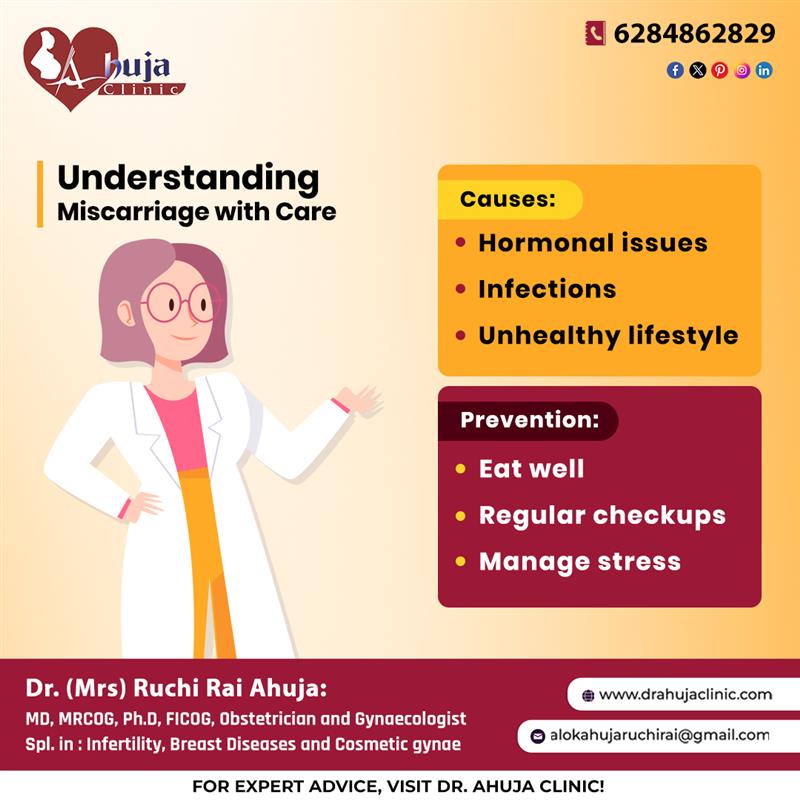
‘Welcome, future mothers!’
If you’re living the most beautiful phase of carrying a precious life within you, congratulations! As you are going to enchant this chapter, it’s important to be conscious to ensure a healthy and happy pregnancy.
One invaluable thing you should be informed of is
What Causes Miscarriage? – Dr Ahuja Clinic is a renowned, specialised gynaecological hospital in Chandigarh. At Ahuja Clinic, we are here to shed light on what causes miscarriage and guide you with empowering information to support a tiny heartbeat throbbing inside you.
In India, approximately 7% of pregnancies resulted in miscarriages, stated to the National Family Health Survey (NFHS). Miscarriages often occur in the first trimester (12 weeks). Its commonality occurs in about 10-20% of known pregnancies.
Having a miscarriage doesn’t mean limited to the bleeding and cramping; instead, it involves emotional grieving. Having gone through this unexpected happening may trigger a range of feelings such as disgust, anger, guilt, anxiety, depression, etc.
Though the factors describing What Causes Miscarriage are unknown, some other factors are known to contribute to its occurrence. To help you be more careful during pregnancy, Dr Ahuja Clinic provides a comprehensive guide on the meaning of miscarriage, its possible causes and reasons, and preventive care methods.
Miscarriage is the sudden and unexpected demise of the fetus. It is also known as stillbirth, leading to the baby’s death before it is fully developed. Miscarriage is a naturally occurring event in which a pregnancy ends before 20 weeks of gestation, unlike abortion.
It usually happens when a pregnancy stops growing. Eventually, the pregnancy tissue will pass out of the body. During this process some women feel crampy, period-like pain, and go through a severe vaginal bleeding.
A large portion of spontaneous miscarriages, nearly 70 to 80 per cent, occur in the first 12 weeks of pregnancy.
Experiencing a miscarriage can be an emotionally and physically overwhelming chapter in a woman’s life. The exact causes of the occurrence of miscarriage are unidentifiable. Besides, here are the potential reasons and causes of the miscarriage.
Fetal Chromosomal Abnormalities
The most recurring cause of miscarriage, especially in the first trimester, is a chromosomal abnormality in the developing fetus.
Chromosomal abnormalities refer to a condition that may occur due to the abnormal number of eggs or sperm, resulting in an abnormal number of embryos. It can also lead to miscarriage, stillbirth, and a baby with severe birth defects.
Maternal Health Conditions
During pregnancy, a mother needs to be in optimal health by taking follow-up care, a balanced diet, medications, etc. This is because dealing with certain health conditions in the mother can increase the risk of miscarriage.
This generally includes uncontrolled diabetes, infections, hormonal imbalances, hypothyroidism, hyperthyroidism, and autoimmune disorders.
Infections
From the beginning of pregnancy, you need to maintain proper hygiene and sanitation around yourself. This is significant to distance yourself to be in a contact of infection or an infected person. Infections are prone to increasing the risk of miscarriage during pregnancy.
Uterine Abnormalities
Uterine abnormalities are the structural abnormalities are structural defects in the uterus or cervix that can negatively impact a woman’s reproductive health.
The signs of these anomalies might include fibroids, an abnormally shaped uterus, or an incompetent cervix (opening too early). A woman going through this condition is more likely to experience a miscarriage.
Nutritional deficiencies
Nutritional deficiencies during pregnancy can lead to serious health issues for both the mother and the developing baby, including premature birth, low birth weight, birth defects, and even miscarriage.
No longer experiencing or disappearance of the symptoms of pregnancy, such as nausea, vomiting, breast tenderness, and lethargy, can indicate miscarriage, and these signs are a greater cause for concern.
Here are the key signs and symptoms highlighting the prevalence of miscarriage:
These are the signs and symptoms associated with an early pregnancy loss. If you suspect any of the mentioned signs, seek medical advice promptly for proper diagnosis and management.
After having a miscarriage, many women became worried about their successful pregnancy in the future. No wonder, as it is completely natural to feel concerned or anxious about the possibility of conceiving again.
But here’s the hopeful truth: and the answer to your question, ‘yes’, it is very much possible for most women to get pregnant again and have a healthy pregnancy, even after surviving multiple miscarriages. The human body is resilient, and with the right follow-up care, one may be blessed with a successful pregnancy within a few months after having a miscarriage, allowing for the fulfilment of the dream of motherhood.
However, consulting a gynaecologist can provide the right guidance, ensuring you’re physically and emotionally ready for the next step.
In a woman’s life, going through a miscarriage can be an emotionally draining and heartbreaking episode. However, a miscarriage does not mean your journey toward motherhood is over. With proper care, prenatal vitamins, and medical guidance, you can always overcome your challenges and hope for a playful future.
Q1. After a miscarriage, are you prone to have another one?
It is not true. Miscarriage is a sudden event that can impact a healthy pregnancy, and it may happen to any woman. It is a hoax spread that having a miscarriage may increase the risk of a subsequent miscarriage.
Q2. How long after a miscarriage can you try to get pregnant again?
Though it’s all based on your mental and physical recovery. But according to doctors’ advice, you should wait until your first menstruation after a miscarriage or up to three months.
Q3. How are miscarriage cramps different from pregnancy cramps?
It is studied that miscarriage cramps tend to be more painful and prolonged than pregnancy or period cramps. They are accompanied by heavy vaginal bleeding, abdominal, pelvic pain, and even labor-like contractions.
Copyright © 2025 Dr Ahuja Clinic. All Rights Reserved | Marketing by : WebHopers
Website Design by CSW Technologies